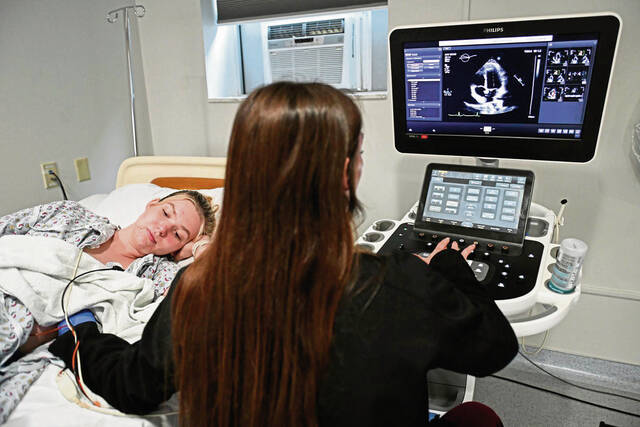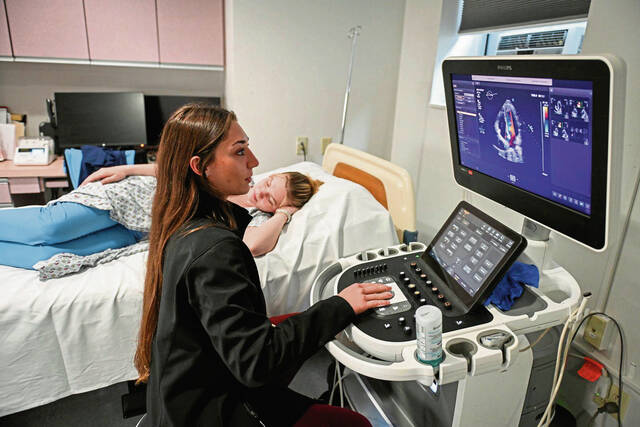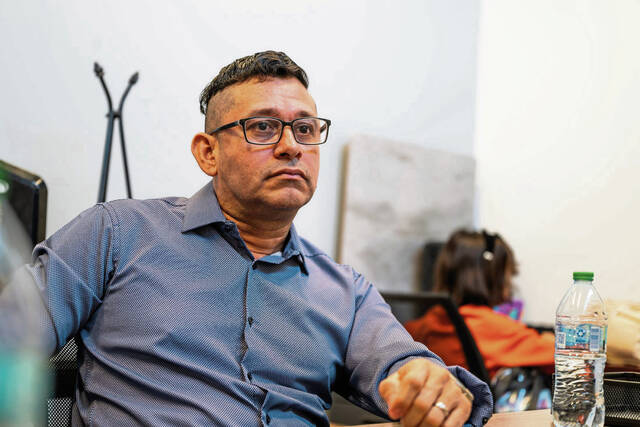Cardiovascular analysis that used to take hours can now be done with the click of a button at Allegheny Valley Hospital in Harrison.
As artificial intelligence seeps into almost every aspect of life, the technology is helping to revolutionize medical care at the Allegheny Health Network community hospital.
“When you look at medicine, AI can take a multitude of data and generate a highly detailed 3D image from a traditional 2D image, giving clinicians precise, consistent analysis,” said Dr. John Balacko, medical director of the echocardiographic lab at the Carlisle Street hospital.
The hospital upgraded its “echo” machines with AI-aided software called HeartModel.
It also installed the cutting-edge care at AHN Natrona Heights: Tri-County Cardiology Office and the AVH New Kensington Outpatient Center.
Where doctors used to spend hours sifting through 100 images and countless data points from a basic echocardiogram, that analysis is performed almost immediately with AI-assisted technology, Balacko said.
“Despite visual interpretations by cardiologists being fairly consistent in my experience, the AI gives precise measurements in the sense that you don’t have variability from one tech or physician to another,” he said.
“With the push of a button, we’re getting a finer-quality interpretation without variability. We’re getting more in-depth analysis for proper diagnosis.”
The software was purchased with a $268,000 grant from the Alle-Kiski Medical Center Trust, along with $50,000 from Allegheny Valley Hospital.
Dr. Venkatraman Srinivasan, a cardiologist and board member of the trust for 20 years, said the grant aligned perfectly with the board’s mission to help patients.
“We think this is the future of the examination of the heart,” Srinivasan said. “It does more than what humans can compute, and it does it in a 3D model.”
According to a 2023 report by Morgan Stanley, 94% of hospitals nationwide were implementing or planning to implement AI technologies.
At West Penn Hospital, also in the Allegheny Health Network, a 3D imaging system called Vectra is used to capture signs of skin disease, employing 92 cameras and a vast database of information.
The algorithm the machine uses is an example of artificial intelligence.
Srinivasan said AI can analyze medical images with speed and accuracy that eclipses human ability. It will be a key component of cardiac care moving forward, he said.
“AI can give us much more than what we could do in the past,” he said. “It’s here to stay.”
According to the National Institutes of Health, AI software can identify patterns or abnormalities that could be missed by a sonographer.
It also can increase productivity by easing workflow for humans and lead to improved patient outcomes, according to the NIH.
Balacko believes the initial assist from AI software is just the tip of the iceberg.
Technology is in development to instruct laypeople to perform an echo image, he said.
That doesn’t mean physicians or cardiac sonographers will be replaced by computers. At Allegheny Valley, there are five technicians on staff whom Balacko described as the lab’s most valuable asset.
“They generate the pictures that we rely on,” he said.
Instead, AI is a crucial tool that will enhance patient care, he said.
“Physicians and hospital systems that don’t use it will lose the job to those who do,” Balacko said.











